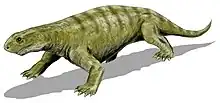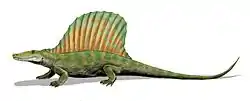| Phthinosuchia Temporal range: Middle Permian, | |
|---|---|
 | |
| Life restoration of Phthinosuchus discors | |
| Scientific classification | |
| Domain: | Eukaryota |
| Kingdom: | Animalia |
| Phylum: | Chordata |
| Clade: | Synapsida |
| Clade: | Therapsida |
| Suborder: | †Dinocephalia (?) |
| Clade: | †Anteosauria (?) |
| Infraorder: | †Phthinosuchia Romer, 1961 |
| Subgroups | |
|
See text. | |
Phthinosuchia is an extinct group of therapsids including two poorly known species, Phthinosuchus discors and Phthinosaurus borrisiaki, from the Middle Permian of Russia. Phthinthosuchus is known a partial crushed skull and Phthinosaurus is known from an isolated lower jaw.[1] The two species have traditionally been grouped together based on their shared primitive characteristics, but more recent studies have proposed that they are more distantly related. Phthinosuchus is either a carnivorous gorgonopsian relative[2] or an anteosaurian dinocephalian while Phthinosaurus is either a herbivorous rhopalodont dinocephalian[2][3] or a therocephalian.[4]
Phthinosuchia was named by American paleontologist Everett C. Olson in 1961, who considered it the most primitive infraorder within Therapsida. A year later Olson named the new infraorder Eotheriodontia and reclassified Phthinosuchia as a subgroup of eotheriodonts, along with the families Biarmosuchidae and Brithopodidae. Each species has been placed in its own family; Phthinosuchidae was named by Soviet paleontologist Ivan Yefremov in 1954 for both Phthinthosuchus and Phthinosaurus, while Phthinosauridae was named by Leonid Tatarinov in 1974 for Phthinosaurus alone.[5]
References
- ↑ Kazlev, A.; White, T. (14 November 2009). "Therapsida: Phthinosuchidae". Palaeos.com. Retrieved 25 November 2012.
- 1 2 Kemp, T.S. (2011). "The origin and radiation of therapsids". In Chinsamy-Turan, A. (ed.). Forerunners of Mammals. Bloomington: Indiana University Press. pp. 3–30. ISBN 978-0-253-35697-0.
- ↑ Ivakhnenko, M. F. (2008). "Cranial morphology and evolution of Permian Dinomorpha (Eotherapsida) of eastern Europe". Paleontological Journal. 42 (9): 859–995. doi:10.1134/S0031030108090013. S2CID 85114195.
- ↑ Battail, B. (2000). "A comparison of Late Permian Gondwanan and Laurasian amniote faunas". Journal of African Earth Sciences. 31 (1): 165–174. doi:10.1016/s0899-5362(00)00081-6.
- ↑ Battail, B.; Surkov, M.V. (2003). "Mammal-like reptiles from Russia". In Benton, M.J.; Shishkin, M.A.; Unwin, D.M. (eds.). The Age of Dinosaurs in Russia and Mongolia. Cambridge: Cambridge University Press. pp. 86–119. ISBN 9780521545822.





.jpg.webp)